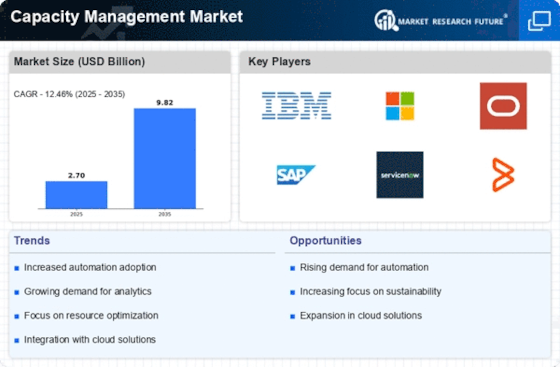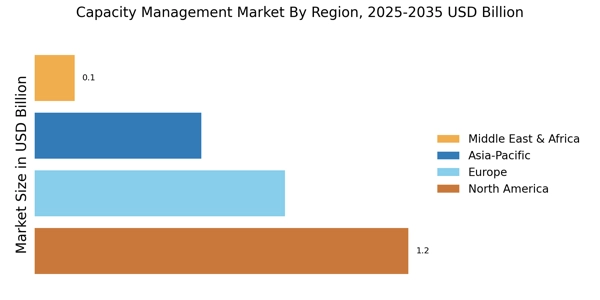Advancements in Technology and Analytics
Technological advancements are revolutionizing the Capacity Management Market, enabling organizations to leverage data analytics for improved decision-making. The integration of advanced analytics and machine learning into capacity management solutions allows businesses to forecast demand more accurately and optimize resource allocation. Current trends indicate that companies utilizing data-driven capacity management can achieve a 20% increase in operational efficiency. As technology continues to evolve, the demand for innovative capacity management tools that harness the power of analytics is likely to rise. This trend suggests a dynamic future for the Capacity Management Market, where technology plays a pivotal role in shaping capacity management practices.
Increased Focus on Operational Resilience
In an era marked by rapid changes and uncertainties, operational resilience has emerged as a critical focus for organizations, significantly impacting the Capacity Management Market. Companies are investing in capacity management solutions to enhance their ability to adapt to fluctuations in demand and supply chain disruptions. Research indicates that organizations with robust capacity management practices can improve their resilience by up to 25%. This focus on resilience is driving the development of advanced capacity management tools that provide predictive analytics and scenario planning capabilities. As businesses prioritize resilience in their operational strategies, the Capacity Management Market is expected to experience sustained growth, reflecting the need for adaptive capacity management solutions.
Growth of Digital Transformation Initiatives
Digital transformation is reshaping how organizations operate, leading to an increased focus on capacity management. The Capacity Management Market is experiencing growth as businesses adopt digital tools to streamline operations and improve service delivery. A report indicates that organizations investing in digital transformation are likely to see a 20% increase in operational efficiency. This shift towards digital solutions is driving the demand for capacity management systems that can integrate with existing technologies and provide real-time insights. As more companies embark on their digital journeys, the Capacity Management Market is poised for significant expansion, reflecting the critical role of capacity management in achieving digital success.
Rising Demand for Efficient Resource Allocation
The increasing complexity of business operations necessitates effective resource allocation, which is a primary driver in the Capacity Management Market. Organizations are striving to optimize their resources to enhance productivity and reduce operational costs. According to recent data, companies that implement capacity management solutions can achieve up to a 30% reduction in resource wastage. This trend is particularly evident in sectors such as manufacturing and IT, where the need for efficient resource utilization is paramount. As businesses continue to expand and diversify, the demand for sophisticated capacity management tools is likely to grow, indicating a robust market potential for providers in the Capacity Management Market.
Emphasis on Sustainability and Environmental Responsibility
Sustainability has become a central theme in business strategy, influencing the Capacity Management Market. Companies are increasingly recognizing the importance of sustainable practices, which often require effective capacity management to minimize waste and optimize resource use. Data suggests that organizations focusing on sustainability can enhance their brand reputation and customer loyalty, leading to a potential 15% increase in market share. This growing emphasis on environmental responsibility is driving the adoption of capacity management solutions that support sustainable operations. As businesses strive to meet regulatory requirements and consumer expectations, the Capacity Management Market is likely to see a surge in demand for solutions that align with sustainability goals.


















